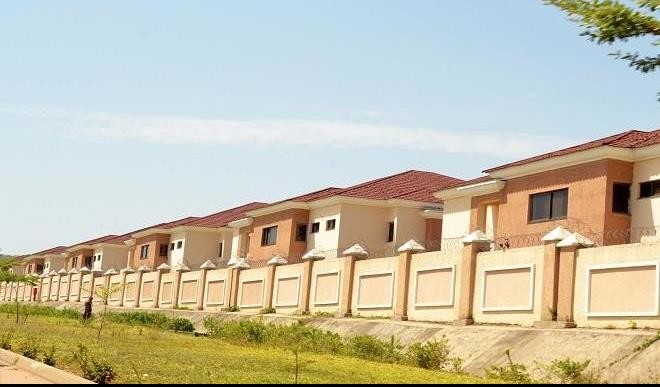Gwarimpa: Nigeria’s largest housing estate battles distortions
Gwarimpa in Nigeria’s capital city Abuja is the largest single housing estate in West Africa. The estate, which was designed and built by the administration of late General Sani Abacha, houses civil servants, diplomats, private businessmen and other high income earners. The mega housing estate boasts of some of the most beautifully designed houses and […]

File photo
Gwarimpa in Nigeria’s capital city Abuja is the largest single housing estate in West Africa.
The estate, which was designed and built by the administration of late General Sani Abacha, houses civil servants, diplomats, private businessmen and other high income earners.
The mega housing estate boasts of some of the most beautifully designed houses and sits on an expanse of land measuring about 1090 hectares with seven residential areas demarcated by large avenues.
Apart from the masterpiece in design and architecture, the estate boasts of good road networks for vehicular movement.
However, the estate is fast expanding with developers taking buffer areas to build small estates within the main Gwarimpa Estate.
As a result, some of the features that take the estate a notch above other estates in Abuja are fast disappearing as home owners are now abandoning original building plans and approvals.
Daily Trust reports that some areas, beginning from the 1st and 5th Avenues designated for residential purposes are fast growing into business hubs. Several residential buildings mostly located within the road corridors are now being converted to shops and plazas where people do their everyday businesses.
Residents told our reporter on a visit around the 2nd and 3rd Avenues that the buying and selling that goes on along the road corridor has been undermining public safety, comfort and convenience of the neighbourhood.
A cross section of those who spoke said some of the buildings along the road that have been converted from houses to shops contribute to disrupting the free movement of vehicles thereby leading to congestions especially before and after working hours.
One of the residents in the 3rd Avenue Yusuf Mohammed said, “The conversion of houses to shops especially those close to the road is now a norm here. It is mostly from evening that you can see them.”
It was also observed that the central water channels and drainages are usually blocked with debris that accumulate from the areas where buying and selling takes place, often leading to flood whenever there is heavy downpour.
The drainage systems in front of most of these shops which used to be residential buildings are blocked with discarded polythene bags which disrupt the free flow of water in the channels.
Apparently worried by the growing distortions in the estate, the Federal Housing Authority (FHA), alongside the FCT Administration, recently embarked on an inspection of the estate.
The Managing Director of the Federal Housing Authority (FHA), Prof. Muhammad Al- Amin, told journalists during the inspection that the estate was intended to be a neighbourhood centre but that people have over the years built structures that were not in conformity with the set standards.
He said the illegal structures, which usually blocked drainage systems have made the estate vulnerable to flooding.
“It is on this note that the Federal Government, particularly the FCT Minister, Mallam Muhammad Musa Bello, has insisted that every plot must tally with the designs and specifications of the FCT and the Master Plan. So, we have marked plots with notice of contraventions and we are determined to ensure that the right thing is done,” he said.
He added that places of worship and schools have taken over most of the district areas which is not what it is supposed to be.
“We also have the Kado Binko village market, which has been a concern to a lot of residents here. When you come around 3pm up till 8pm in the evening, it is difficult to pass through the market conveniently. That type of obstruction must give way for smooth passage,” he said.
The managing director added that the contraveners would be given a time frame before any action is taken against them.
“Government is also working hard to develop the city centre which will take the major activities off the road corridors in Gwarimpa. We have marked but we have to follow all the procedures to the letter before we enforce,” he also stated.
Also speaking, the Coordinator, Abuja Metropolitan Management Council (AMMC), Umar Shuaibu, said the council is mandated to make sure people build in Abuja according to the rules and regulations governing the entire city plan, adding that Gwarimpa Housing Estate is not an exception.
